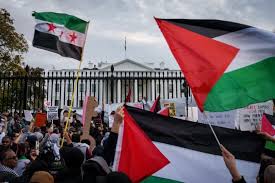Portugal and Germany have taken major steps toward recognizing Palestine as an independent state, joining a growing list of nations showing support for Palestinian sovereignty. The latest move marks a turning point in global diplomacy regarding the Israel-Palestine conflict.
Speaking to the media, Portugal’s Foreign Minister Paulo Rangel said that his government is preparing to officially recognize the State of Palestine—possibly as early as next month. He made it clear that the decision comes from Portugal’s own independent foreign policy, not from any external pressure. Rangel stressed that Portugal believes recognizing Palestine is essential for peace in the Middle East.
At the same time, Germany has sent a strong message to both Israel and the international community. German officials warned that if peace talks do not resume soon between Israel and Palestine, Berlin may also recognize Palestine unilaterally. They added that the long delay in negotiations is leaving no other option open.
This shift in position from two key European Union (EU) countries follows earlier moves by other influential nations. The United Kingdom, France, Canada, Ireland, and Malta have all recently shown willingness to move toward recognizing Palestinian statehood. These changes reflect growing global concern about the lack of progress toward a two-state solution, which has long been the basis for peace in the region.
Earlier this year, France and 14 other countries signed a joint declaration called the “New York Call” during a United Nations General Assembly meeting. This declaration urges the world to formally recognize Palestine as a sovereign state. Supporters say the move would help restart peace talks and build momentum for a lasting solution.
The declaration states, “It is time for the international community to recognize the right of the Palestinian people to their own state, and to ensure equal rights and lasting peace for all.” The call is gaining traction as frustration grows over repeated failures in peace efforts.
Meanwhile, Israel has opposed unilateral recognition of Palestine, saying it must only come through direct negotiations. However, many countries now argue that decades of stalled talks have left the international community with no other choice. Human rights groups and peace advocates argue that recognizing Palestine could rebalance the power dynamics and pressure both sides to return to the negotiating table.
According to a BBC report, even Norway, Spain, and Slovenia are moving in the same direction. Norway and Spain officially recognized Palestine earlier this year, citing the urgent need for diplomatic solutions in light of the ongoing violence in Gaza and the West Bank (source).
Some analysts say these growing recognitions could isolate Israel diplomatically if it refuses to resume negotiations. Others argue it may bring new energy into peace efforts, especially if the United States becomes more engaged following the November 2024 elections.
In addition to diplomatic concerns, humanitarian agencies have pointed to worsening conditions in Palestinian territories. A report by Al Jazeera shows that poverty, lack of access to clean water, and restricted movement continue to harm daily life in Gaza and the West Bank (source). Recognition of Palestine, they say, could open doors for international aid and better infrastructure development.
The United Nations General Assembly has already granted Palestine the status of a non-member observer state, and over 140 countries have recognized Palestine as a state, mostly in Africa, Asia, and Latin America. However, most Western nations, including many EU countries and the United States, have hesitated—until now.
With Portugal’s announcement and Germany’s warning, the momentum is clearly shifting. If more countries follow, global recognition of Palestine as an independent state may soon become the norm rather than the exception.
For now, the world watches closely. Will this wave of recognition pressure both Israel and Palestine back to the negotiation table? Only time will tell, but one thing is clear: the international community is no longer willing to wait silently as the conflict continues with no resolution in sight.





